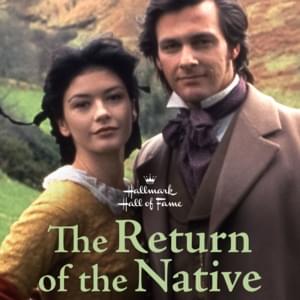
The Return of the Native (Chap. 4.5) Thomas Hardy
На этой странице вы найдете полный текст песни "The Return of the Native (Chap. 4.5)" от Thomas Hardy. Lyrxo предлагает вам самый полный и точный текст этой композиции без лишних отвлекающих факторов. Узнайте все куплеты и припев, чтобы лучше понять любимую песню и насладиться ею в полной мере. Идеально для фанатов и всех, кто ценит качественную музыку.

The Journey across the Heath
Thursday, the thirty-first of August, was one of a series of days during which snug houses were stifling, and when cool draughts were treats; when cracks appeared in clayey gardens, and were called "earthquakes" by apprehensive children; when loose spokes were discovered in the wheels of carts and carriages; and when stinging insects haunted the air, the earth, and every drop of water that was to be found.
In Mrs. Yeobright's garden large-leaved plants of a tender kind flagged by ten o'clock in the morning; rhubarb bent downward at eleven; and even stiff cabbages were limp by noon.
It was about eleven o'clock on this day that Mrs. Yeobright started across the heath towards her son's house, to do her best in getting reconciled with him and Eustacia, in conformity with her words to the reddleman. She had hoped to be well advanced in her walk before the heat of the day was at its highest, but after setting out she found that this was not to be done. The sun had branded the whole heath with its mark, even the purple heath-flowers having put on a brownness under the dry blazes of the few preceding days. Every valley was filled with air like that of a kiln, and the clean quartz sand of the winter water-courses, which formed summer paths, had undergone a species of incineration since the drought had set in.
In cool, fresh weather Mrs. Yeobright would have found no inconvenience in walking to Alderworth, but the present torrid attack made the journey a heavy undertaking for a woman past middle age; and at the end of the third mile she wished that she had hired Fairway to drive her a portion at least of the distance. But from the point at which she had arrived it was as easy to reach Clym's house as to get home again. So she went on, the air around her pulsating silently, and oppressing the earth with lassitude. She looked at the sky overhead, and saw that the sapphirine hue of the zenith in spring and early summer had been replaced by a metallic violet.
Occasionally she came to a spot where independent worlds of ephemerons were passing their time in mad carousal, some in the air, some on the hot ground and vegetation, some in the tepid and stringy water of a nearly dried pool. All the shallower ponds had decreased to a vaporous mud amid which the maggoty shapes of innumerable obscure creatures could be indistinctly seen, heaving and wallowing with enjoyment. Being a woman not disinclined to philosophize she sometimes sat down under her umbrella to rest and to watch their happiness, for a certain hopefulness as to the result of her visit gave ease to her mind, and between important thoughts left it free to dwell on any infinitesimal matter which caught her eyes.
Mrs. Yeobright had never before been to her son's house, and its exact position was unknown to her. She tried one ascending path and another, and found that they led her astray. Retracing her steps, she came again to an open level, where she perceived at a distance a man at work. She went towards him and inquired the way.
The labourer pointed out the direction, and added, "Do you see that furze-cutter, ma'am, going up that footpath yond?"
Mrs. Yeobright strained her eyes, and at last said that she did perceive him.
"Well, if you follow him you can make no mistake. He's going to the same place, ma'am."
She followed the figure indicated. He appeared of a russet hue, not more distinguishable from the scene around him than the green caterpillar from the leaf it feeds on. His progress when actually walking was more rapid than Mrs. Yeobright's; but she was enabled to keep at an equable distance from him by his habit of stopping whenever he came to a brake of brambles, where he paused awhile. On coming in her turn to each of these spots she found half a dozen long limp brambles which he had cut from the bush during his halt and laid out straight beside the path. They were evidently intended for furze-faggot bonds which he meant to collect on his return.
The silent being who thus occupied himself seemed to be of no more account in life than an insect. He appeared as a mere parasite of the heath, fretting its surface in his daily labour as a moth frets a garment, entirely engrossed with its products, having no knowledge of anything in the world but fern, furze, heath, lichens, and moss.
The furze-cutter was so absorbed in the business of his journey that he never turned his head; and his leather-legged and gauntleted form at length became to her as nothing more than a moving handpost to show her the way. Suddenly she was attracted to his individuality by observing peculiarities in his walk. It was a gait she had seen somewhere before; and the gait revealed the man to her, as the gait of Ahimaaz in the distant plain made him known to the watchman of the king. "His walk is exactly as my husband's used to be," she said; and then the thought burst upon her that the furze-cutter was her son.
Комментарии (0)
Минимальная длина комментария — 50 символов.












